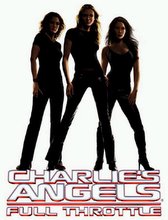Postmodernism in Film (Charlie's Angels-full throttle
But, of course, postmodernism in film hit its high-water mark and began its decline with That Guy. You know who I'm talking about: Quentin Tarantino, the man who re-energized cinema with his intelligent and entertaining postmodern style, and the man whose influence has become so vast and misguided that the success or failure of postmodernism in film hangs in the balance. Am I being too drastic? Do you even care? I guess if you've read this far you do, or you're just really bored at work.A film like Pulp Fiction so shook the foundation of Hollywood that Tarantino became a cinematic example of Harold Bloom's "Anxiety of Influence", meaning that he's such a towering figure that later artists find it impossible to escape from his shadow. Most people think Pulp Fiction's influence began and ended with that slew of hip, neo-noir films like 2 Days in the Valley and other forgettable bullshit. No way. I wish it were so. Those were easy to spot because they're imitating Tarantino right down to the genre. But those aren't the dangerous ones because they're so obvious that they're innocuous. Think QT doesn't influence Charlie's Angels 2: Full Throttle? Think again.
To help understand this better, let's look at a textbook example mentioned earlier: Charlie's Angels 2. This is a film is the cinematic equivalent of Terry Schiavo: it cannot live on its own. Yeah, that was pretty bad, I guess. What I mean to say is that every scene in Charlie's Angels 2 is meant to refer to either another film, video or pop culture phenomenon. Its entrenchment in the fads of the past is almost autistic, but probably more like retarded. It's a revue-style pageant in which we watch four hot women try on a lot of different costumes and re-enact scenes from other movies that we all remember and enjoyed. Not to mention that, on top of all of this, it's a sequel to a film of a TV show.
While the first movie employed some of the same logic, it was done to much more success because it let the audience in on the joke, allowing it to act as reader and "author" in the postmodern sense of the word. While director McG is without a doubt far from being the coldest beer in the fridge, there was a sense of postmodern playfulness about Charlie's Angels that saved it from being a total waste of time. But after its success, the sequel became an ADD-fest that seemed to be made up of skits producer/star Drew Barrymore thought up in makeup that morning ("I just saw Raiders of the Lost Ark last night ... shoot it!"). Let me stress that I firmly believe this to be unconscious. Neither of these folks can spell postmodern, but the point is that this form of postmodernism has become part of the pop culture zeitgeist ... and its approaching entropy. This is the crisis point: a dozen texts stapled together and given a new name, or, worse (and more accurate): a postmodern text without a text.
http://lifegoesoff.blogspot.com/2005/05/essay-title-re-postmodernism-in-film.html
Friday, March 16, 2007
Subscribe to:
Post Comments (Atom)

No comments:
Post a Comment